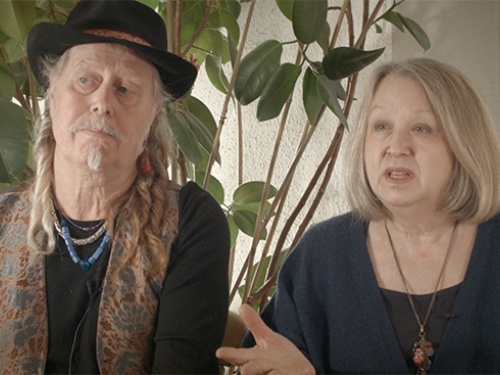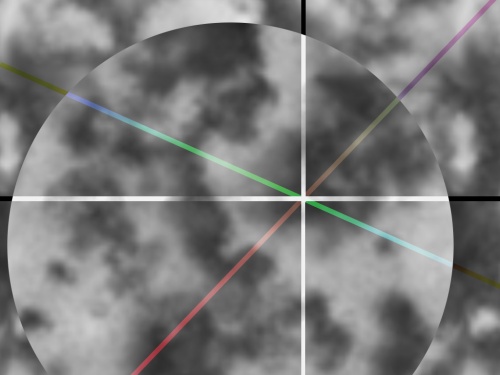Andy Holden and David Raymond Conroy in conversation with Anna Gritz
Andy Holden and David Raymond Conroy talk to our associate curator Anna Gritz about their stage adaptation of Brief Interviews with Hideous Men - a selection of pieces from David Foster Wallace's collection of short stories. The text is examined through a variety of staging techniques, such as the use of earpieces and autocues, as well as with more traditional dramatic monologues, all punctuated by the unspoken questions of the audience in the form of a projected letter Q.
Q. Brief Interviews with Hideous Men is not an obvious choice for a stage adaption, what was it that made you want to bring it to the stage, and how did your collaboration on the project came about?
Andy Holden: I really felt very strongly, immediately upon finishing the book that it was actually an obvious choice and a necessary thing to do. From the very moment of finishing the last page I had a feeling of nervous anticipation and didn’t want to look on the internet to see if it had already been adapted, instead sketching out in my mind how it might be done. One crucial way for me, in imagining how it might be done was to ask David Raymond Conroy if he would be interested in doing it together, as I knew how much the book meant to him - it had been his recommendation that I read it. The book, I knew, would become the next object in a conversation between us that had been unfolding since we met around a year ago.
David Raymond Conroy: Andy said he was interested in somehow staging the text and immediately I was interested in doing it. I agree it is not an obvious choice for a stage adaptation, though strange, because it gives you so much - it is already somewhat in the form of a script, but also so little - there is only ever one person speaking, there isn’t a narrative arc from one interview to the next, and there is very little contextual detail. A staging would inherently be very close to a reading, so my first question was if we wanted to do something other than a straight readthrough of the interviews, and how could we do something that added to the text?
Q. It is your first venture into theatre; can you speak a little about your experience of directing and working with actors and how it relates to your work as visual artists.
AH: I very much enjoy being out of my depth and it’s been interesting immersing ourselves in a language that exists and has rules, but that neither of us speak, or know how to follow. It means at times we’ve been reinventing the wheel, and ended up at some probably obvious decisions, but the way of arriving at them, through constantly discussing the relationship between illusion and realism, the printed word and the spoken word, drama and naturalism, has been fascinating. There are many overlaps with our work as artists, as we both do live performance with explicit interest in the monologue as a form. We both also work with sculpture, often functioning as a prop or immersed in narrative potential, which translates conformably to the construction of the stage. The main leap for me is having a concrete, autonomous text to refer back to, a thing that belongs to neither of us, that we both are captivated by, and want to explore, learn from, but always make sure we do justice to.
DRC: I know we both seem to be trying to deal with similar concerns around irony and sincerity and we wanted to get some sort of emotional connection with the work that we make as individuals. Of course our works are also enmeshed with other concerns that are quite separate, so we often come into this shared area from quite different angles. I’ve always been interested in ideas about seduction and being convincing as a performer and working with actors has really been a fascinating process because you can mould their performances and ask them to hit certain emotional spaces which is something that I personally can’t control when I am doing a performance. Directing is a way to make a performance whilst at the same time watch it, which is something that I find incredibly satisfying because you end up with something that is both really close to you and truly outside.
Q. For your adaption you have selected five essays from the book, what made you chose these over the others?
AH: Obviously in terms of adapting the book to the stage it was the ‘interview’ pieces that we were the most inclined to adapt. The idea of the unspoken question, the Q that is so characteristic about the book and that places the reader within the book as both subject and object seemed to lend itself well to the experiment of translating it to a theatre audience. The Q creates a dramatic pause on stage as if the audience had asked the actor a question, implementing the audience into the space of an exchange and pushing further the questions of empathy and communication that are so crucial to the book. However, to make sense of the book as a whole it seemed interesting to attempt one story in the form of a reading, and our decision was to choose Forever Overhead as a prologue. I have composed a piece of music to accompany this reading, and we have made a video projection which will fill the screen at the back of the stage. This story, like many in the book, expands and echoes themes found in the 'interviews'; such as self-consciousness as paralysing. The boy on the high diving board on his thirteenth birthday, preparing to jump but being paralysed by overthinking, the allegorical aspect, of being somehow outside the text and then finally plunging in, entering the 'adult' word below, puberty as a fall into the entrapment of the self-consciousness that seems to encapsulate the hideousness of many of the characters in the ‘interview’ pieces.
DRC: We went through the book separately and then I went over to Andy’s studio and sat and went through all the ones we had chosen and the ones we had both chosen made a shortlist. The selection down to the final four interviews and Forever Overhead became quite pragmatic in terms of wanting to represent the entire book in some way. We knew right from the outset that we wanted to tackle B.I. #20; the last interview in the book and the longest. I remember it having a really profound effect on me when I read it and became a marker for what art can achieve. Why we chose the shorter pieces would be more protracted to explain but I primarily think they were among our favourites, then in addition to that we wanted to do something overtly funny (humorous that is), a relationship breakup one because I think they are the easiest to see yourself in, and one that was more overtly technical in the way it tries to position you morally or ethically.
Q. For each piece you selected a different mode of delivery, what determined the stylistic ploys you chose and how do they relate to the respective pieces?
AH: The question we preoccupied ourselves with the most was how text leaves the page, becomes active within the mind of someone listening or reading, and how this works when it is mediated by an actor. So we’ve experimented with both the way the actor receives his lines and the way he then attempts to transmit them. The first idea was the use of the autocue as it created a space of great tension between reading and acting. It allowed us to be faithful to Wallace’s prose and echoed the theme of intimacy and communication through storytelling. The interview we use this for (B.I. #20) is a self-conscious description of an unselfconscious narrative about direct empathy; and the action of the space between reading and acting inherent in the use of autocue seem to keep the delicate space that the text creates by, in the end, being closer to storytelling which is what allows space for empathy within the text itself. The use of the earpiece in Act 3 (B.I 59) was very interesting as again it hopefully adds an extra layer to the narrative of the character, who in his madness had renounced all responsibility.
DRC: Something that seemed crucial to our imagining of the staging of the texts was this idea of a kind of formal reflexivity, or at least an overt formal consciousness. We were interested in both the practicality of staging texts of various lengths but also that move, which I think the book does so well, a kind of oscillation, or simultaneity between being absorbed in the text and being aware of how it functions. I also think of there being a movement around this idea of realism, so each part, in a different way, tries to address this idea of an actor playing a part in a way that seems realistic, but whether it's realistic to the stage, everyday interactions or reading is not so clear cut. Combined with this desire we wanted to allow the subject of each text a conceptual reflexivity, so that what is being read is reinforced as a group of ideas by the way in which it is read.
This article is posted in: Blog, Events, Video
Tagged with: Actor, Anna Gritz, interview, Literature, Performance, Theatre, writing





